(Shorter Version)
2013 Gloucester Schooner Races
Every Labor Day weekend, America's oldest fishing port, Gloucester, Massachusetts, still holds schooner races as part of their big maritime celebration. It all began in 1920 as a challenge among the Grand Banks fishing schooners of Gloucester and those of their rival Canadian fishing port of Lunenburg, Nova Scotia. In the first race, the American fishing schooner Esperanto beat the Canadian boat Delawana. But the following years mostly belonged to the 143-foot Canadian schooner Bluenose, which was specifically designed for the races. These days, the bigger boats (over 80 feet) contend for the Esperanto Cup (obviously named after the first winner of the International Fishing Vessel Championship). The rest of the schooners are divided into two classes, over/under 45 feet in length.
I knew right away which boat I wanted to be on for the 2013 races: the American Eagle, built in Gloucester, but now sailing out of Rockland, Maine. I had met boat and skipper John Foss on my many coastal sea canoe trips and knew that he and his boat were going for their tenth win. What a feat that would be. I wanted to be part of that historic occasion.
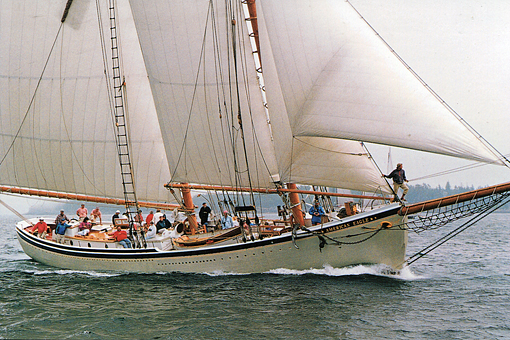
Off to the races
So on August 28, 2013, at 6:00 p.m., we 26 passengers, each with varied sailing experience, boarded the 92' schooner in Rockland. We met Skipper John Foss and deck crew of three competent young men, as well as cook Andy and his assistant. Everything looked just right and just as I had expected from my schooner sail across the Atlantic as watch captain some years ago. The wood-paneled galley even had an old-fashioned woodstove to cook the meals on, bake bread, muffins and pies, as well as radiate welcome heat on cold, foggy mornings, of which we had quite a number.

Author boarding American Eagle in Rockland, Maine
It took us two days to get down to Gloucester. The first night we anchored behind Peaks Island in Casco Bay near Portland, the second in the outer Gloucester anchorage off Niles Beach. Both times we dropped anchor around sunset, with the golden light fading as supper was served on deck.

Skipper at the helm
Getting ready for the races
After breakfast and weighing anchor the next morning, Skipper Foss took his American Eagle outside the breakwater to have us all practice for tomorrow's race. The weather was again not the best. There was some rain, some lightning and variable winds, barely up to 10 knots. But we met up with our competition: the slender, high-sided and very fast Virginia, who had beaten our boat by a few seconds in the past, while in other years it was the other way around. And then there were the two schooners Adventure and Roseway, formerly owned and skippered by Jim Sharp out of Camden, Maine, and last but not least, Boston's sluggish-looking Liberty Clipper.

Re-learning the ropes
Everybody was watching everybody else. We were speed testing against Virginia, who was sporting her topsails and flying jib, neither of which we had. But our mainsail was massive and brand new; so was the foresail. We were able to keep up with our competition and felt good. Time to motor into the inner harbor and tie up at the Maritime Gloucester dock. Soon thereafter, Virginia and Roseway tied up alongside. So there was quite some people-traffic on board. The pier was even busier: there was a group of Morris dancers, accompanied by squeezebox, fife and drums, showing off their stuff. A small band was playing Irish songs and chanteys in the style of the Irish Rovers of the seventies, while lots of people were enjoying a lobster meal on the grassy slopes of the park across the street.
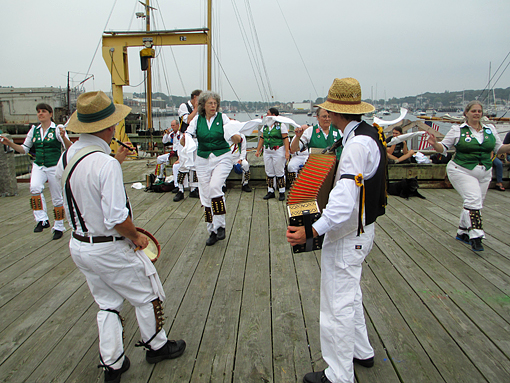
Morris dancers in Gloucester
Returning to the boat, I just caught a glimpse of Skipper rowing off in the little red dinghy with a big galvanized tub to fetch lobsters for tonight's pre-race dinner. Nice energy and motivation to do well in the race tomorrow, I thought to myself. Then the parade of lights (smaller boats) passed by us into the inner harbor, and a tad later we all enjoyed significant fireworks, which were set off from a barge off the promenade. A memorable evening indeed, Gloucester's big Labor Day maritime celebration.

Skipper fetching lobsters for our pre-race feast
Schooner parade and the race
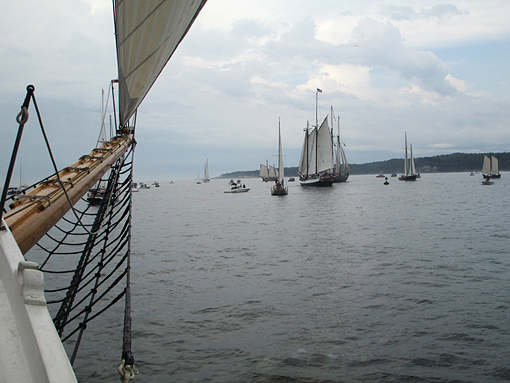
Off to the parade
In the morning we had to wait for guests to board the Roseway and Virginia as well as our schooner, before we could shove off and join the boat parade past the Fisherman's Memorial at the flag-studded promenade. Motors kept most of the schooners and other sailboats in check. There were smaller sailboats and motorboats galore, but also a pod of old-fashioned fishing dories filled with eager, brightly clad young Gloucester rowers, as well as several traditional 6-8 person rowing gigs and a myriad of sea kayaks. The press was out in their own boat, sporting high-powered telephoto lenses, and describing the event in very important-sounding Tom-Brokaw-like voices.

Virginia, Roseway & Adventure during the parade of sails

Young dory-rowers at the parade
Being one of the 5 biggest schooners, which do not turn too well in tight spaces, we soon headed out to the starting line, where at 1:00 p.m sharp the first gun went off: 10 minutes to the start. The wind was still light, about 10 knots, but our skipper managed to position American Eagle next to the committee boat on the starboard end of the starting line so that we would sail off on starboard tack and have right of way over the entire fleet of 19 schooners. The timing was perfect for a big boat in light winds. Well done, Skipper! I also felt the new wind was coming in over starboard. So I definitely felt this was the right tack to take. After 30 minutes, though, the wind shifted to port and favored Adventure,Virginia and Roseway.
Liberty Clipper was completely out of the race, since she just did not have the speed like the rest of the boats.
The medium-sized schooner Adirondack rounded the mark first. We were close behind. Virginia over-stood the mark by a long shot and lost the race right there, as I saw it, allowing Adventure to pass her. From the turning mark it was almost a dead down-wind hitch to the finish line. So most schooners sailed wung out, i.e. they had one boom to port and one to starboard, allowing jib and jumbo/staysail to luff in the wind shadow behind those huge sails.

The finish line: "We did it!"
All we had to do was stay between the finish line and our competition, ahead of Adventure and our arch-rival Virginia. Roseway looked pretty with her russet sails, but only came in fourth. The town of Gloucester was elated to see their schooner Adventure come in a close second (in its first race after a lengthy and costly reconstruction), only 3:42 minutes behind us, and beating Virginia by a scant 34 seconds. Adventure was well sailed, and I wondered whether its former skipper Jim Sharp was on board as an adviser – which he was, as I found out at the awards ceremony.

Star of the day: local schooner Adventure, rounding the breakwater
Following an old but harsh sailing tradition, our first-mate hoisted a broom to the top of the mast, suggesting this boat swept the entire field – well, at least the large schooner class (over 80'), in the Esperanto Cup race. However, line honors were earned by the small schooner (19'-45') Tillicum 1, closely followed by the two medium-sized schooners (45'-80') Tyrone and Brilliant. We came in fourth overall.
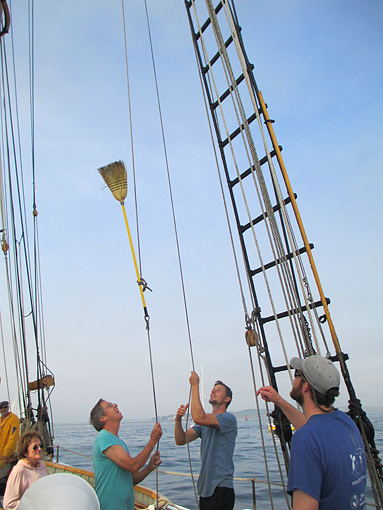
Hoisting the broom
Loud, hearty "Hip-hip-hurrays" were shouted across the waters on our way back into the inner harbor. It was a very joyful time, none more so than for Skipper John Foss, who had herewith won his tenth race with his boat, the American Eagle. What a feat! And everybody on board was very proud of him and his boat. I know I was.
Supper, including libations, was served on shore under a big tent on the Maritime Gloucester pier. Skippers and crew were exchanging their stories of how the race went. Everybody was then very jovial and gracious, accepting their respective trophy with a short speech.

Skipper John Foss accepting the Esperanto Trophy
Homeward bound
But for us, the celebration ended right here. We went back on board and got ready for a night sail "downeast", back to Rockland, Maine. Yes, it was here that the term "downeast" originated. Boston schooners would often sail "downwind" (wind from behind) before a prevailing SW wind, in a northeasterly direction. If you then add the almost 20° variation (compass correction) to your compass course, you would end up steering almost due east on your compass, therefore the term "downeast", downwind, more or less to the east.
My cabin-mate and I hit our bunks almost immediately, since we had signed up for the 2:00-4:00 a.m. night bow-watch. It was foggy, real foggy, and the sky was full of heat lightning, as we strained our eyes and ears to make out other boats. We were about 23 miles off shore, off the Isles of Shoals, as we came on deck. The sea was very lumpy; we occasionally stuck the long bowsprit in the water, as our trusty engine, fore and staysail pushed us along at our usual 6-7 knot speed.

Foggy anchorage in Port Clyde, ME
We heard or saw no other boat, and encountered no icebergs either, as I jokingly added to our report when the next watch came on deck. We eventually ducked into Port Clyde, still in thick fog, and dropped anchor. Then the rains came down, and we had a subdued lunch under extra awnings on deck or the galley below. However, a grand supper of roast beef and hand-cranked ice cream lifted everybody's spirits.
We were back at our dock in Rockland the next morning, 10:30. a.m., exactly as planned.

Heading into homeport - Rockland, ME
End of trip
Then suddenly everything went very fast. We took a group picture, packed our things, exchanged addresses, shook hands all around, and in no time the boat and even the dock were empty. The crew picked up our bags of dirty linen, collected the trash, pumped out the holding tank, and already started working for the next trip, a shorter 4-day loop around Penobscot Bay, starting tomorrow morning.
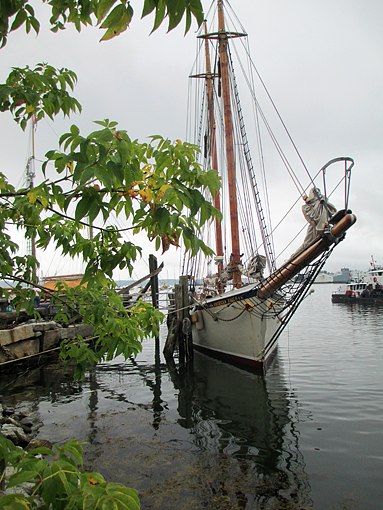
Trip over
On my way home to Orono, it slowly dawned on me what a significant trip it had been. OK, the weather could have been better, the wind a bit stronger for the race, but those are factors one cannot change. All in all, it was a very memorable and successful 7-day trip on a classic, 83-year-old 92-foot fishing schooner, which had just won its tenth Esperanto Cup race in its birthplace, Gloucester, the oldest fishing port in the USA. I was pleased and proud to have been part of it.
"Hip-hip-hurray to the American Eagle and her Skipper!"
Notes:
The 92' Schooner American Eagle was launched in 1930 as the Andrew
& Rosalie, the last fishing schooner built in Gloucester. She was renamed American Eagle in 1941. She made her last fishing trip in 1983 and was then sold to Capt. John Foss and towed to Rockland, Maine for rebuilding as a vacation windjammer for 26 passengers and a crew of 6, including skipper. After a complete rebuild, she was relaunched in 1986 and has since sailed mostly in Maine waters, but also participated in numerous Opsail events in New York, Boston and Lunenburg, Nova Scotia, Canada. In 1991 she was designated a National Historic Landmark.
The trip down to her "birthplace", Gloucester, for the traditional Labor Day schooner festival and races, has become a long-standing tradition and the highlight of each sailing summer. This year's win in the big boat class, the Esperanto Cup Race, was the American Eagle's tenth win for boat and Skipper John Foss.
For more info on boat and trip schedule, check out: www.schooneramericaneagle.com
The Esperanto Cup Race was named after the 107' schooner Esperanto. She was designed by Boston's famous naval architect Tom McManus and built in Essex, Massachusetts in 1906. She was named for the international language Esperanto, an "easy to learn, political neutral language that would transcend nationality and foster peace and international understanding," according to my Wikipedia source. It is based on L.L. Zamenhof's 1887 book Unua Libro.
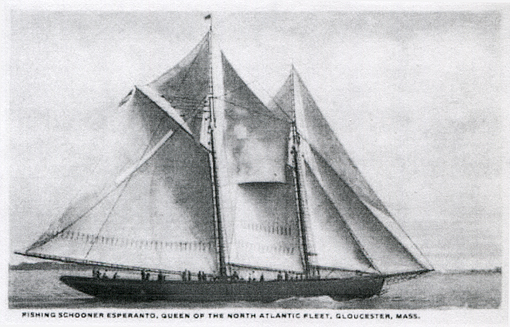
In 1920, America's Esperanto was the first winner in the International Fishing Vessel Championship, a match-race of sorts (like the America's Cup Races) between the boats of the two greatest fishing ports in the United States and Canada: Gloucester and Lunenburg. Delawana's loss in this first race prompted Canada to design and build the famous Bluenose. However, just months after Esperanto's win, she struck the wreck of the schooner State of Virginia (have I also heard that name before?) off Sable Island, Nova Scotia and sank. So in 1921 Esperanto obviously could not defend her title, and the brand new 143' Bluenose trounced the Gloucester boat Elsie and many more great Grand Banks schooners out of Gloucester thereafter.
************************
© Reinhard Zollitsch
BACK TO TOP OF PAGE